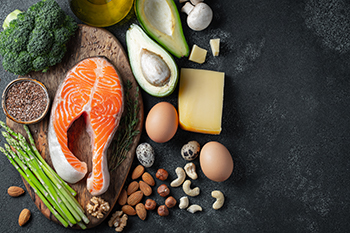More Health and Nutrition Bites
Related
Get your exercise
An international study suggests that more exercise reduces your risk of death - regardless of your weight.
Fight hunger - with chewing gum
About ten years ago I reported on a pair of research articles looking at the effect of gum chewing on appetite and snacking: could chewing gum be an effective weight loss tool?
Does Drinking Water Help You Lose Weight?
Patients have been asking me for years if drinking water would help them lose weight. While I certainly recommend that people switch from sodas (diet or regular) to drinking water, coffee, or tea, there hasn't been a whole lot of evidence for a link between drinking water and weight loss alone.
Health & Nutrition Bites
Get the latest health and diet news - along with what you can do about it - sent to your Inbox once a week. Get Dr. Gourmet's Health and Nutrition Bites sent to you via email. Sign up now!
Low-carb vs. high-carb: who's less hungry?

The fad diet wars continue, with more and more variations of a low carbohydrate diet being invented every few months, it seems. There's Atkins, South Beach, keto, paleo, and a host of other diets that essentially direct you to stop eating grains in favor of protein (in the form of meats, most often) and fat.
In terms of weight loss, it does appear that for the short term a low-carbohydrate diet may help you lose weight faster than a more moderate or high-carb diet. The problem, however, is maintaining that weight loss. Losing weight is great, but if you can't keep it off, what good does it really do you? That's even more important if you have been diagnosed with diabetes.
Researchers based primarily in Australia (J Nutr 2020;00:1-6) randomly assigned 84 clinically overweight or obese persons who had previously been diagnosed with type 2 diabetes to one of two different diets.
The two diets were matched in the number of calories consumed in the sense that all of the participants cut their usual caloric intake by about 30%. The difference between the two diets was that one diet was considered a Very Low Carbohydrate (VLC) diet, with less than 14% of calories from carbohydrates (less than 50 grams of carbohydrate per day); and the other was a High Carbohydrate (HC) diet, with 53% of calories from carbohydrates. All of the participants attended professionally-led exercise classes 3 days per week throughout the study.
The participants followed their assigned diets for two years, while the researchers monitored not only their weight but also their appetite. Using a visual scale of 1 to 100 (least to most), for a 7-day period at weeks 0, 4, and 16, the authors asked the participants to rate their feelings of hunger, fullness, desire to eat, and how much they felt they could eat (prospective consumption) at regular intervals before and after each meal of their day.
Somewhat unsurprisingly (to me, anyway), the two groups lost about the same amount of weight over the two years of the study: It didn't seem to matter which diet the participants followed.
While they lost the same amount of weight (statistically speaking), the participants didn't experience the reduction in overall calories in quite the same way: those following the High Carbohydrate diet reported feeling "greater 'daily overall'" fullness (that is, "How full do you feel right now?") than those on the Very Low Carbohydrate Diet as well as feeling greater "reduced prospective consumption," which could be described as "How much could you eat right now?"
In short, those on the High Carbohydrate diet felt fuller on a day-to-day basis and were less hungry than those on a Low Carbohydrate diet.
What this means for you
On the one hand, this research suggests that if you are looking to lose weight, your overall caloric intake is more important than what you eat in terms of macronutrients like protein, fat, or carbohydrate.
That said, it does appear that a high-carb diet, one with plenty of quality carbohydrates like whole grain breads and pastas as well as legumes, fruits, and vegetables, will help you stick to your diet better because you're more satisfied over the long haul.
Once again: a diet that you can stick with, that's delicious and satisfying, is better than any fad diet that demonizes a whole food group or macronutrient. And your long term health is all about what you can stick with for the (surprise!) long term.
First posted: January 22, 2020

